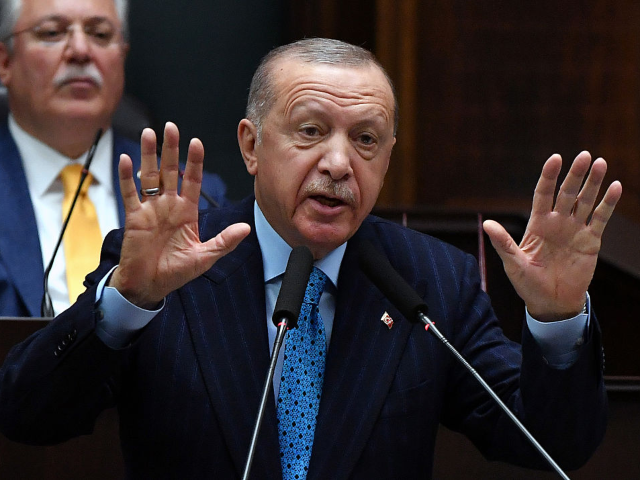Turkey’s Erdogan: More Migrants and ‘Nuclear Leakage’ Could Reach Europe if Iran Regime Falls
 Mustafa Istemi/ dia images via Getty Images
Mustafa Istemi/ dia images via Getty Images
Turkish strongman Recep Tayyip Erdogan reportedly warned in a conversation with German Chancellor Friedrich Merz on Friday that Europe could face a new mass migration wave and “nuclear leakage” if the conflict between Iran and Israel escalates.
Erdogan held the conversation with Merz in anticipation of expected talks between Iran and a group of foreign ministers representing Europe, including Germany. French and British diplomats are also expected in the conversations alongside Iranian Foreign Minister Abbas Aragchi, a result of the countries’ participation in the 2015 Joint Comprehensive Plan of Action (JCPOA), the defunct 2015 nuclear deal brokered by former President Barack Obama.
No information on the results of those talks has been published at press time.
Turkey’s state-run Anadolu news agency offered few details on Erdogan’s warnings in its coverage of the conversation with Merz.
“Turkish President Recep Tayyip Erdogan on Friday said that the spiral of violence triggered by Israel’s attacks could harm the region and Europe in terms of migration and the possibility of nuclear leakage,” Anadolu relayed. “In a phone call with German Chancellor Friedrich Merz, Erdogan said that nuclear disputes with Iran should be resolved via talks and warned that Israel’s attack has severely heightened threats to regional security, according to Türkiye’s Communications Directorate.”
Due to its geographic location, Turkey has received more refugees than nearly any other country on earth in the past two decades. It has particularly welcomed a large number of Syrian refugees fleeing the fallen regime of former dictator Bashar Assad; Turkish officials estimated nearly 3 million Syrian refugees were in the country in mid-2024 shortly before the fall of the regime. As a result, Erdogan has repeatedly threatened to flood Europe with unmanageable numbers of migrants when negotiations on issues his regime prioritizes, such as involvement in European Union affairs or trade exchanges, hit roadblocks. Tensions rose significantly in 2020 after Erdogan facilitated migration of Afghans, Iraqis, Syrians, and other migrants to Europe, prompting requests from European governments to regulate migrant flows.
“After we opened the doors, there were multiple calls saying ‘close the doors,’” Erdogan said in March of that year. “I told them, ‘It’s done. It’s finished. The doors are now open. Now, you will have to take your share of the burden.'”
The conflict between Israel and Iran has not at press time triggered any international mass migration, though a large number of residents of Tehran have reportedly attempted to leave the capital. According to the Turkish newspaper Hurriyet, the Turkish Defense Ministry has not seen any increase in migrant activity coming from Iran since the conflict began.
Iran has engaged in months of negotiations with the administration of President Donald Trump this year in pursuit of an agreement to lift sanctions on the rogue Islamist regime. In exchange the Trump administration has demanded that Iran begin respecting international law regarding nuclear development and cease its threatening nuclear activities, particularly uranium enrichment. The regime has aggressively refused to stop its enrichment, which is being conducted at levels far higher than those necessary for any civilian uses, making an agreement impossible under current conditions.
Last week, the International Atomic Energy Agency (IAEA) revealed that it had evidence that Iran had produced enough fissile material to make three nuclear weapons in the past three months and that it was maintaining secret nuclear facilities, hiding them from the U.N. watchdog organization. The IAEA passed a resolution condemning Iran on June 12.
Hours later the government of Israel launched “Operation Rising Lion,” targeting Iranian nuclear facilities and senior terror leaders in Tehran. Iran has since retaliated by bombing civilian areas in Israel, most recently bombing a hospital on Thursday.
Erdogan offered to mediate between Israel and Iran on Monday, claiming Turkey has “state wisdom and deep experience” useful to resolving the dispute.
“We have clearly conveyed to all our counterparts that we, as Turkey, are ready to do whatever is required of us, including facilitating the process,” Erdogan affirmed.
“Just as we have overcome many difficulties with honor in the past, we will, God willing, keep our country away from the negative effects of the crises in our region,” he added. “Unlike some, we are not interested in pouring gasoline on the fire, but in extinguishing it before it grows any further.”
Erdogan, a radical Islamist leader who openly supports the jihadist terror organization Hamas, is poorly positioned to take on a primary role in mediating between Israel and Iran. In the immediate aftermath of Hamas’s siege of Israel on October 7, 2023, Erdogan declared, “Hamas is not a terrorist organization” and organized a massive anti-Israel rally in his country. Hamas is one of Iran’s most prominent terror proxy organizations in the region, part of what the regime refers to as the “axis of resistance” community of jihadist terror organizations.
Neither Iran nor Israel have indicated publicly at press time that they have an interest in Turkish involvement in resolving the conflict.
Follow Frances Martel on Facebook and Twitter.
Source link

